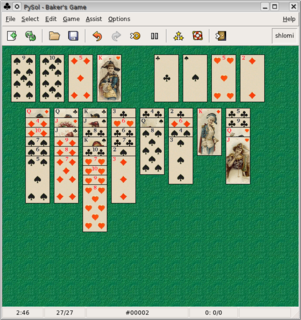Related Research Articles

Klondike is a solitaire card game. In the U.S. and Canada, Klondike is the best-known solitaire card game, to the point that the term "solitaire", in the absence of additional qualifiers, typically refers to Klondike. Equally in the UK, it is often just known as "patience". Elsewhere the game is known as American Patience, as well as Fascination, Triangle or Demon Patience.

FreeCell is a solitaire card game played using the standard 52-card deck. It is fundamentally different from most solitaire games in that very few deals are unsolvable, and all cards are dealt face-up from the very beginning of the game. Although software implementations vary, most versions label the hands with a number.

Calculation is a solitaire card game played with a standard pack of 52 cards. It is part of the Sir Tommy family of patience games. It has its origin in France, where it is known as La Plus Belle.

Baker's Game is a patience or solitaire card game similar to FreeCell. It predates FreeCell, and differs from it only in the fact that sequences are built by suit, instead of by alternate color. This makes the game more difficult to complete successfully.

Spider is a type of patience game, and is one of the more popular two-deck solitaire games. The game originates in 1947, and its name comes from a spider's eight legs, referencing the eight foundation piles that must be filled to win the game.

Simple Simon is a patience or solitaire card game played with a regular 52 cards deck. It is a close relative of the well-known Spider Solitaire. It became somewhat popular being featured in some computerized collections of Solitaire card games, but its origins possibly predate its implementation as a computerized game.
Eight Off is a patience or solitaire card game, named after its employment of eight cells, played with one deck of playing cards. The object of the game is to move all the cards into the foundations. It served as a partial inspiration for the popular solitaire game FreeCell.

Napoleon at St Helena is a patience or solitaire card game. It is quite difficult to win, and luck-of-the-draw is a significant factor. It is also popularly known as Forty Thieves. Other titles include Roosevelt at San Juan, Big Forty, and Le Cadran, although these can at times refer to variant forms of the game.
Canfield is a patience or solitaire card game with a very low probability of winning. It is originally a casino game, and in the United States is named after casino owner Richard A. Canfield, who popularised it in the 1890s. While commonly called Canfield in the United States, it is usually called Demon in the United Kingdom. It is closely related to Klondike, and is one of the most popular Solitaire games.

Scorpion is a patience or solitaire card game using a deck of 52 playing cards. Although somewhat related to Spider, the method of game play is akin to Yukon. The object of this game is to form four columns of suit sequence cards from king down to ace.

Baker's Dozen is a solitaire card game using a deck of fifty-two playing cards. The game is so called because of the 13 columns in the game, the number in a baker's dozen.
Flower Garden is a solitaire card game using a deck of 52 playing cards, and is based on an old Japanese game. It is also known under the names The Bouquet and The Garden. The terms used in this game are related to gardening. Some skill is needed to successfully complete the game, and skilful players can win more than 20% of the time.
British Square is a solitaire card game which uses two decks of 52 playing cards each. It has an unusual feature of switchback building whereby each foundation is first built up and then built down.
Penguin is a patience or solitaire card game, invented by David Parlett, which uses a deck of 52 playing cards. The game play is similar to solitaire card games like the popular Freecell and its predecessor Eight Off.
Westcliff is a patience or solitaire card game which is played using a deck of 52 playing cards. It is a variation of Klondike that is fairly easy to win; one can win this game nine times out of ten.

Miss Milligan is a patience game which is played using two decks of playing cards. According to Peter Arnold, author of Card Games for One, this classic game's enduring popularity is in part due to its amazing tendency to enable complete recovery from seemingly hopeless positions. Winning chances with good play are about 1 in 20 games.
German Patience is a solitaire card game which is played with two decks of playing cards shuffled together. It is an unusual game because building in the tableau or playing area is up, as opposed to building down in many others. Despite its name, it is not known if this game originated from Germany.
Four Corners, also known as Les Quatre Coins, Cornerstones, or Corner Patience, is a solitaire card game which is played with two decks of playing cards. It is so called because of the pile of four cards at the corners of the tableau.

Golf is a patience or solitaire card game where players try to earn the lowest number of points over the course of nine deals. It has a tableau of 35 face-up cards and a higher ratio of skill to luck than most other solitaire card games.

La Belle Lucie is a solitaire card game where the object is to build the cards into the foundations. It is considered to be representative of the "fan" family of solitaire card games.
References
- ↑ "Seahaven Towers" (p.308) in Bicycle Official Rules of Card Games by Joli Quentin Kansil (ed.), 1999. ISBN 1-889752-06-1
- ↑ Longwood Wizard's Guild, archived from August 2016.
